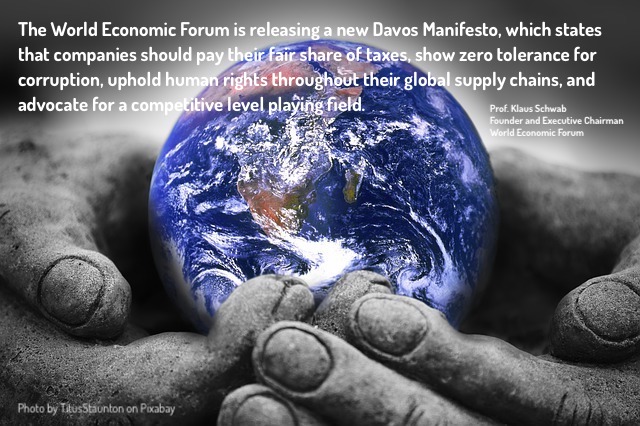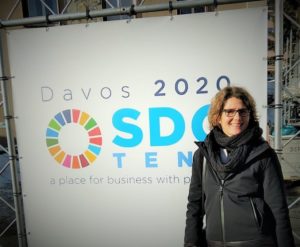
01.2020 Stakeholder Economy
Prof. Klaus Schwab promoted a frame called „stakeholder capitalism“. His interpretation of this form of economy as well as the phrase itself was widely discussed. The Davos participants are criticized for their raider behaviour, draining the resources of the planet, causing climate change. Such the new Davos Manifesto is a step into the right direction and we would like to interpret what we have watched during the meeting.
The principal assumption of the stakeholder economy is, that every company that wants to prosper over time, must not only deliver financial performance, but also show how it makes a positive contribution to society. Consequently companies must benefit all of their stakeholders, including shareholders, employees, customers, and the communities in which they operate.
But where do we go from here? How can public interest be built into economic organizations? Workers could be on boards to represent their interests, but what about the rest of the community? How can we incorporate environmental and social purpose into corporations?
As the concept takes an anthropocentric perspective, while some groups like the general public may be recognized as stakeholders others remain excluded. Such a perspective does not give plants and animals or even soil and natural raw materials a voice as stakeholders, but only an instrumental value in relation to human groups or individuals.
Basic economics shows that the planet cannot carry our linear production path any longer. The circular economy represents a significant opportunity, as well as a challenge, for all of us. As the consequences of our current production model are becoming increasingly evident, the circular economy proposes a radically different way of thinking about economic activity: a way that also safeguards economic prosperity in the long term. By laying down the economics behind a circular model, it provides the theoretical foundation to further explore the conditions for increased prosperity and care for the environment.
By re-organizing our economy along the principles of our global life support system, that is the ecosystem of planet earth, the circular economy enables us a continuous cycle of value creation, where nothing is wasted and economic, social and environmental value creation is optimized.
Circularity and systemic thinking challenge our current way of thinking and spurs us into action. It encourages us, whether in government, business or civil society, to develop circular strategies and acknowledging our interdependence for system change.
Circularity@Davos
 This week Business leaders, politicians and leading academics will meet with environmental activists to discuss business and sustainability at the World Economic Forum’s 50th annual meeting in Davos, Switzerland.
This week Business leaders, politicians and leading academics will meet with environmental activists to discuss business and sustainability at the World Economic Forum’s 50th annual meeting in Davos, Switzerland.
Over the years it has changed from an elite gathering of Western entrepreneurs and industrialists to discuss business deals to a much broader platform for the global community to draw attention to issues like poverty and the environment, and to lobby their leaders for real change. It seems the global business community is gradually beginning to understand that there has been a serious problem in our shared perspective on climate change – namely, the notion that environmental and business interests are intrinsically at odds with one another.
A new report published by WEF has revealed that more than half of the global economy – some $44 trillion – is at risk because of climate change. Industries such as construction, agriculture and the food and beverages sector all depend on the sustainability of natural resources to remain profitable. In short, global warming is bad for the planet, but it is also bad for business. World leaders must understand that the gross domestic product of their nations is inextricably linked to nature, and businesses must acknowledge that they have a vested interest in promoting sustainability.
The World Economic Forum must become the stage for conversations that concern all people, their livelihoods and their well-being. Such conversations, when had in earnest, can give rise to genuine and rapid shifts in mind-set. Climate change, the tremendous loss of natural land, the poisoning of the sea, and the dramatic exploitation of the planet’s natural resources are no longer an abstract problem waiting to affect us in a distant future.
Ignoring this accelerating destruction of the planet is no longer a profitable option – neither for the world economy, nor for private businesses and certainly not for the health of the planet and for the people, animals and plants that live on earth. At Davos, businesses must think beyond the extent to which their balance sheets are red or black. They must be green.
Systems thinking ensures safeguard of the future. We create awareness for Circular Economy and Circular Engineering in society, the economy and politics.
Author: Dr. Hans Meves